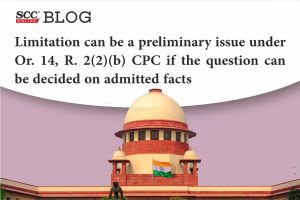Supreme Court: Principal question before the Division Bench of Ajay Rastogi and C.T. Ravikumar*, JJ., for contemplation was whether the issue of limitation can be determined as a preliminary issue under Order 14, Rule 2(2) of the Civil Procedure Code, 1908 (for short ‘CPC’). The Supreme Court while addressing the series of judgments in the instant case dismissed the appeal filed against the judgment of High Court of Delhi.
The trial court framed a preliminary issue on the question of limitation, evidently, upon forming the opinion that case may be disposed of on an issue of law and that it warrants postponement of settlement of other issues until after that issue has been determined and to deal with the suit in accordance with the decision on that issue. The trial court answered the question of limitation in negative, against which the appellant approached the first appellate court, which also dismissed the said suit on the ground of limitation. Thereupon aggrieved by the judgment of the first appellate court the appellant took up the matter before the High Court, where it concurred with the findings and dismissed the appeal answering the question of law against the appellants. At the outset, it is to be noted that the challenge in this appeal is against concurrent findings by three Courts, as mentioned hereinbefore.
Facts to the extent necessary are that, predecessor-in-interest of the appellants, was the bhumidar of certain extent of agricultural land situated in Delhi. The said property was acquired in lieu of which an alternative residential property was to be allotted to the person entitled. The bhumidar died and the exclusive property was allotted to Dhan Singh and not to the other son Nahar Singh (deceased appellant). Allegedly Dhan Singh produced a ‘Relinquishment Deed’ issued by other legal heirs in his favour, and based on which the allotment was made solely for him. It was the contention of the appellant that the deed was obtained fraudulently. Letter for allotment was presented on 08.03.1991, whereas a suit for declaration by the appellant was filed on 14.06.2000.
Analysis:
a. Issue of Limitation: Appellant contended that Limitation is said to be mixed question of law and facts and the view adopted by the lower courts in regard to Order 14 Rule 2(2) CPC is perverse and for such dismissal Order 7 Rule 11(d) CPC would have been appropriate.
On the other hand, it was the contention of the respondent that for determining the nature of suit declaratory suit and the starting point of limitation as relates a declaratory suit was available in the plaint averments themselves. Further it was contended that despite coming to know about the registered Relinquishment Deed dated 21.10.1985, the predecessor-in-interest of the appellant did not resort to civil remedy to get it set aside.
It was observed by the Supreme Court that provisions of Order 6 Rule 11(d) CPC would apply if the averments in the plaint were given face value and taken to be correct in their entirety appear to be barred by any law. The Supreme Court while relying on the judgment in Nusli Neville Wadia v. Ivory Properties, (2020) 6 SCC 557 and answering that whether the issue of limitation could be determined as a preliminary issue under the said Order of CPC observed that, Order 14 Rule 2(2) makes a departure and the court may decide the question of law as to jurisdiction of the court or a bar created to the suit by any law for the time being in force, such as under the Limitation Act. In a case, question of limitation can be decided based on admitted facts, it can be decided as a preliminary issue under Order 14 Rule 2(2)(b).
The Supreme Court held that “appellants cannot legally have any dispute or grievance in taking their statements in the plaint capable of determining the starting point of limitation for the purpose of application of Order 14, Rule 2(2)(b) of the CPC“. It was further held that, “if the court concerned is of the opinion that limitation could be framed as a preliminary point and it warrants postponement of settlement of other issues till determination of that issue, it may frame the same as a preliminary issue and may deal with the suit only in accordance with the decision on that issue. It cannot be said that such an approach is impermissible in law and in fact, it is perfectly permissible under Order 14, Rule 2(2)(b), CPC and legal in such circumstances”.
b. Application of Article 136 of the Limitation Act, 1968: The Supreme Court observed that the contention related to the applicability of Article 136 was jesuitical. A perusal of Article 136 of the Limitation Act, 1968 would reveal the indubitable position that it applies only when an application for execution of any decree (other than a decree granting a mandatory injunction) or order of any Civil Court is to be filed.
It was observed by the Supreme Court, that the inevitable conclusion can only be that Article 136 got no application in the case on hand, one cannot claim for a larger period of limitation of 12 years. The dismissal of the suit was in accordance with the decision on the said preliminary issue, question of limitation is to be considered not with reference to the validity of the Relinquishment Deed as the genuineness of the deed was never challenged.
Appellants sought declarations and thereby made the nature of the suit declaratory hence, the limitation period of 3 years was rightly calculated by lower courts.
Hence, the orders of the lower courts cannot be said to be perverse or illegal as there can be no doubt with respect to the position that consideration of validity of a relinquishment deed and consideration of the period of limitation. No, interference warranted.
Appeal dismissed.
[Sukhbiri Devi v. Union of India, 2022 SCC OnLine SC 1322, decided on 29-09-2022]
*Judgment by: Justice C.T. Ravikumar
*Aastha Sharma, Editorial Assistant has reported this brief.

